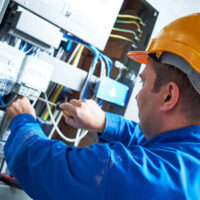Electrical Injuries and Maryland Construction Work

Construction work in Maryland can be extremely dangerous for workers, even when appropriate safety measures are taken in advance. Given that construction workers often must perform job tasks at heights, using heavy equipment and machinery, and in highway work zones, there are various types of hazards to which construction workers are exposed. The Occupational Safety and Health Administration (OSHA) cites common causes of serious and fatal injuries, including falls, caught-in or caught-between accidents, struck-by accidents, and electrocutions. Electrical incidents are not as common as falls on construction sites, but as OSHA emphasizes, “many workers are unaware of the potential electrical hazards present in their work environment, which makes them more vulnerable to the danger of electrocution.”
Much too often, construction workers sustain life-threatening or fatal injuries in preventable electrical incidents on construction sites, including electrocutions. Our Maryland workers’ compensation lawyers can provide you with more information, and we are here to assist you with a workers’ compensation claim in the aftermath of an electrical workplace injury.
Common Types of Electrical Injuries on Construction Sites
There are various ways in which serious electrical incidents and accidents can occur on construction sites in Maryland, but OSHA cites the following as the hazards that are among the most frequent causes of electrical injuries in construction:
- Contact with power lines;
- Lack of ground-fault protection;
- Path to ground missing or discontinuous;
- Equipment not used in the manner prescribed; and
- Improper use of extension and flexible cords.
According to the Centers for Disease Control and Prevention (CDC), almost 60 percent of electrical injuries in workplaces result from direct contact with electricity, and more than 60 percent of electrocution deaths occur on construction sites. The hazards above cited by OSHA can exist on a wide range of construction projects, including new builds, remodels and renovations, repair sites, and trenching and excavation sites.
Preventing Construction Accidents Involving Electricity
Serious and deadly accidents on construction sites usually involve generators, power lines, extension cords, or equipment, according to OSHA. Accordingly, safety measures need to be taken in relation to the specific type of electricity source (or sources) being used on the construction site. To work safely with electricity while doing construction work, OSHA recommends the following:
- Only operate generators outdoors;
- Turn off circuit breakers before starting a generator;
- Turn off generators and give them time to cool before refueling them;
- Always look overhead for power lines, and remain at least 10 feet away from them;
- Check for buried power line indicators before engaging in any trenching or excavation work;
- Always ground electrical lines when you are working near them;
- Use ladders that are made of a non-conductive material like wood or fiberglass;
- Never modify extension cords;
- Only use electrical tools that are double-insulated;
- Inspect any electrical tools or equipment to check for frayed cords, cracks, or any other safety issues prior to use; and
- Never stand in any areas that are wet when you are using electrical tools.
Contact a Maryland Construction Worker Injury Attorney
If you sustained injuries in an electrical accident on a construction site, or if you lost a loved one in an electrical incident, it is important to seek advice from one of the experienced Maryland construction worker injury attorneys at the Law Offices of Steinhardt, Siskind and Lieberman, LLC about obtaining workers’ compensation benefits. Contact us today for more information.
Sources:
blogs.cdc.gov/niosh-science-blog/2019/02/08/electrocution-in-construction/
osha.gov/etools/construction/electrical-incidents
osha.gov/sites/default/files/elect_safety.pdf
